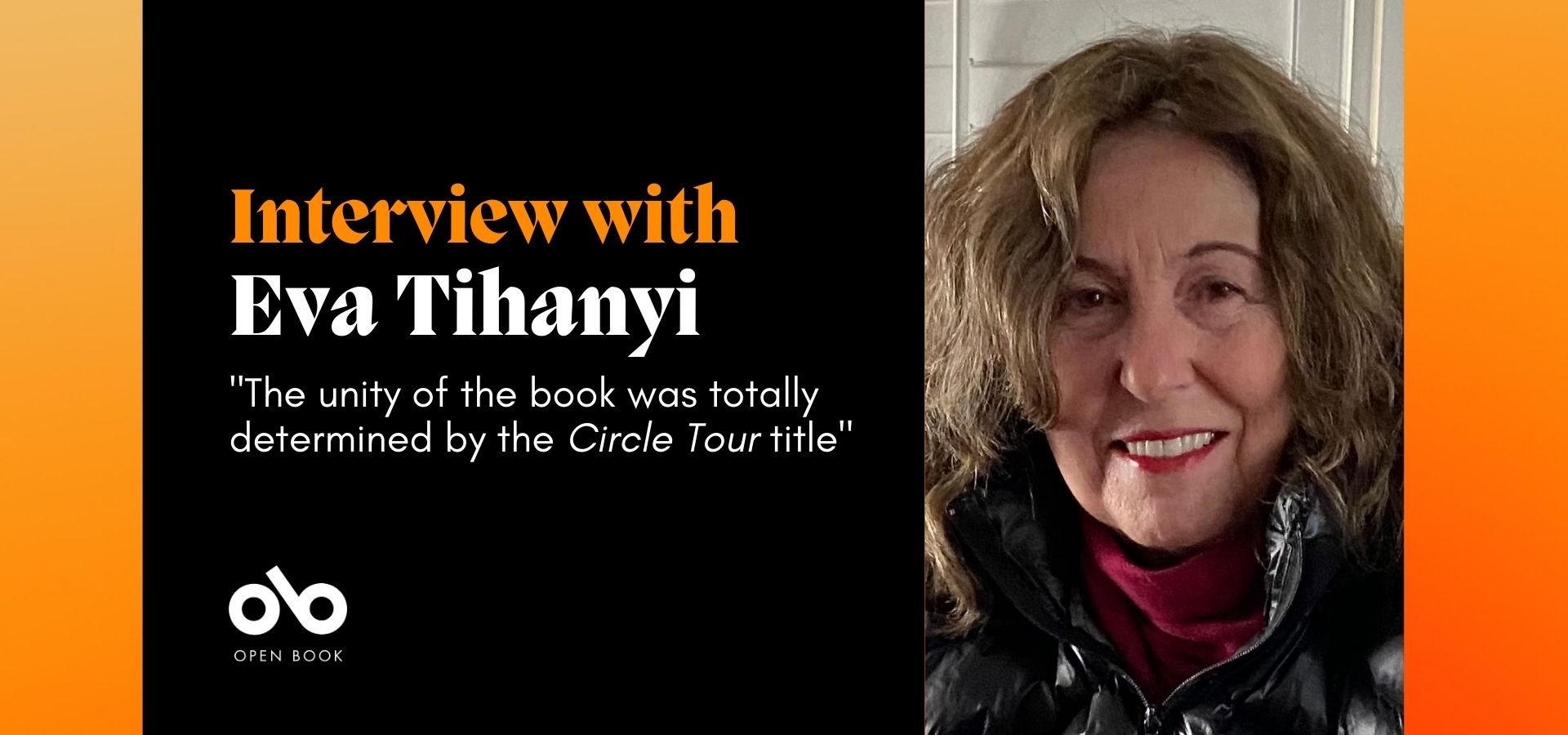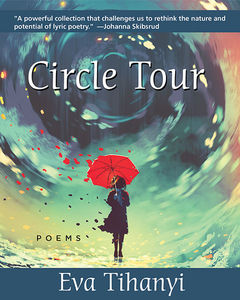Eva Tihanyi's "3-Layer" Poetry Collection Cicle Tour is a Tour de Force
Eva Tihanyi's Circle Tour (Inanna Publications) has a simple but fascinating structure of three sections: the Outer Circle, Inner Circle, and the Centre. Each section has its own power – the outward-facing Outer Circle deals with the poet-character of the collection's engagement with the world, with poems about art and creating in public, with nods to Janis Joplin and Marina Abramovic. From there, a more personal layer emerges in the Inner Circle, with writings about family, motherhood, loss, and friendship.
The Centre section takes readers into the final frontier: the self as laid bare, apart from the world, society, and art. Universal in its intimacy, it tackles aging, mortality, and our own essential nature. Showcasing the paradox of how the most personal can also be the most universal, the Centre section vibrates with immediacy and connection.
Deceptively straightforward but devastating in Tihanyi's hands, the three "layers" of self serve as a perfect structure for the titular "tour", taking readers deep into the self and into Tihanyi's mind. A powerhouse outing for the poet's ninth collection, we're excited to speak with Eva today about it for our Line & Lyric interview series.
She tells us about how she came to the book's fascinating concentric construction, why she consciously avoided the pandemic as a topic in the poems, and about the "unavoidable self-consciousness" and engagement that aging brings to writing about certain subjects.
Open Book:
Can you tell us a bit about how you chose your title? If it’s a title of one of the poems, how does that piece fit into the collection? If it’s not a poem title, how does it encapsulate the collection as a whole?
Eva Tihanyi:
I decided to use Circle Tour as the title of my next book of poetry back in 2018 when I started gathering the new poems I’d written since my last book, The Largeness of Rescue, came out in 2016. I had come across a small collage I had created many years ago which I had titled "Circle Tour" and it still resonated with me. Once I had chosen this title for the new book of poems, it made perfect sense to title the three sections Outer Circle, Inner Circle, and Centre. The unity of the book was totally determined by the Circle Tour title.
OB:
Did you write poems individually and begin assembling this collection from stand-alone pieces, or did you write with a view to putting together a collection from the beginning?
ET:
I generally start out writing individual poems and then eventually the themes emerge. I don’t consciously think about them as I’m writing. However, with Circle Tour I was aware early on how all the poems would fit into the sections. For example, I knew that “Experienced Music” (a poem about the singer Janis Joplin) belonged in the Outer Circle section and that “Conversations with My Son” would go in the Inner Circle section, which focuses on personal relationships.
OB:
What's more important in your opinion: the way a poem opens or the way it ends?
ET:
Although both are important, for me endings are more so. I like endings that have impact, that stay with the reader, that make the poem feel complete. One of my favourite poems from my teenage years is “Fern Hill” by Dylan Thomas, which ends with the lines: “Oh as I was young and easy in the mercy of his means, / Time held me green and dying / Though I sang in my chains like the sea.” The lines still give me goosebumps.
Your CanLit News
Subscribe to Open Book’s newsletter to get local book events, literary content, writing tips, and more in your inbox
OB:
Is there an individual, specific speaker in any of these poems (whether yourself or a character)? Tell us a little about the perspective from which the poems are spoken.
ET:
The speaker in all of the poems is one narrator, “the poet” on her circle tour, which is of course a metaphor for the cycle of life. The one thing I wanted to avoid was to speak directly of the pandemic although there are a number of poems that were born out of it. I didn’t want the book to become dated, to become “a book that was written during the pandemic.” I think its subject matter is more universal and timeless than that.
OB:
What advice would you give to an emerging or aspiring poet?
ET:
Don’t let trends mess with your head. Write what you feel, write who you are. Write for yourself first, not an audience. To quote Shakespeare, the most famous poet of all time, “To thine own self be true.”
OB:
Was there a question or questions that you were exploring, consciously from the beginning or unconsciously and which becoming clear to you later, in this collection?
ET:
The poems in Circle Tour were written during a five-year period (2017 to 2022) and the pandemic fell right into the middle of that, so solitude, nature, our engagements with ourselves and others and the world at large took on a new significance for me. Also, I’m getting older. Aging creates an unavoidable self-consciousness of the fact that we’re all mortal and time is passing.
OB:
What are you working on next?
ET:
I’ve written a long poem sequence called Riffs for the Flamethrower and am working on my first novel.
____________________________________________
Circle Tour is Eva Tihanyi’s ninth poetry collection. She has also published a volume of short stories, Truth and Other Fictions (Inanna, 2009). Tihanyi, who taught English at Niagara College from 1989 to 2020, now writes full time. She lives in the Port Dalhousie neighbourhood of St. Catharines, Ontario. For more information, visit her website.





